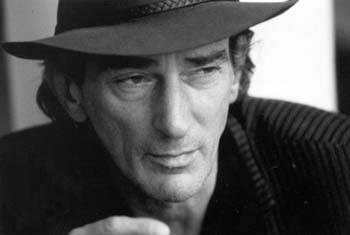Faegheh Atashin (born on 5 May 1950 in Tehran), also known by her stage name Googoosh (Persian: Guguš - گوگوش), is an Iranian singer and actress. She is known for her contributions to Iranian pop music, but also starred in a variety of movies from the 1950s to the 1970s.[1] She achieved the pinnacle of her fame and success towards the end of the 1970s. Her overall impact and contributions to Middle Eastern and Central Asian pop-music earned her the title of the most iconic female pop-singer from those regions. (Read more...)
Shahyar Ghanbari (born 28 July 1950 in Tehran) is an Iranian Poet, Writer, lyricist, songwriter, and singer of Persian pop music.He is also a Film director &Radio-TV Producer. Shahyar is the son of Hamid Ghanbari: Iranian actor, dubber and singer. He writes and sings in Persian, English and French. His songs typically feature Love, Solitude, and nostalgia. Mostly he writes his own lyrics, and composes for himself and for other singers. He Currently lives in U S A. (Read more...)
This song remarks the pains of Iranian migrants in Western countries. In it you hear of Venice, Rome, Paris, London and Los Angles (or as the poet calls it: the city with no angles)
Lyrics
I've traveled around the world.
I've been to the tired Taj Mahal.
I've been to the quite nights of the Shiva
with poetry as my dinner.
Nowhere could be as dear as my homeland,
no room could ever shelter me.
Venice was spectacular with all pirate ships.
A night in Rome with all bishops was a night of lonely springs.
The Madame Tussaud's was empty;
It was a place for chaffy faces.
The double checker red buses dancing in the fog
resembled a carpet being woven on a loom.
The morning in Champs-Elysee's was moonlit;
the Palace of Versailles was fully blue, like Dali's Sleep.
Paris was a sleepless city.
In front of me was the lady with a torch in her hand;
a little further, a black with no job was standing.
The City With No Angles was cold;
with loads of misery on blacks and Indians.
My pain was a nightmare to the painless.
I was next to me yet I felt lonely.
The night when the kites were lonely,
was the beginning and the end.
Lyrics by Shahyar Ghanbari
Translated by Mehdi Mehtari
Gallery
 |
| Googoosh |
 |
| Shahyar Ghanbari |












